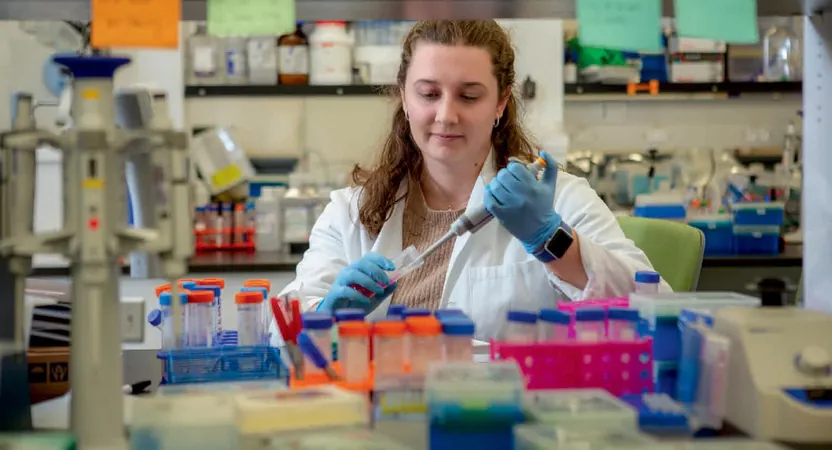
Revolutionary Breakthrough: Researchers Develop Lipid Nanoparticle to Combat Pre-Eclampsia and Save Lives!
2024-12-15
Author: Sophie
Introduction
In a groundbreaking advance from the University of Pennsylvania, engineers have unveiled an innovative solution that could drastically improve outcomes for pregnant individuals grappling with pre-eclampsia. This serious condition, which is characterized by insufficient blood flow to the placenta, leads to elevated maternal blood pressure and poses significant risks to fetal health, including stillbirth and premature birth. Alarmingly, it affects 3 to 5% of pregnancies globally.
Current Treatment Options
Currently, the conventional options for managing pre-eclampsia only address symptoms rather than cure the underlying issues. Treatments often include blood pressure medications, enforced bed rest, or early delivery, irrespective of the baby’s health prospects. The moral and emotional implications of these decisions weigh heavily on expectant parents, as they must navigate between the health of the mother and the wellbeing of the child.
Kelsey Swingle's New Approach
Kelsey Swingle, a Ph.D. student in bioengineering at UPenn, is leading the charge with a promising new approach. Previously, she conducted a proof-of-concept study that illustrated how lipid nanoparticles (LNPs)—the same type used in the mRNA COVID-19 vaccines—could effectively target the placenta in pregnant mice.
Research Findings
Her recent research, published in the prestigious journal Nature, examined an impressive 98 different LNP formulations, identifying one that enhanced mRNA delivery to the placenta by over 100-fold compared to an FDA-approved version. The clinical implications of this are staggering.
“Our lipid nanoparticle achieved remarkable success in delivering an mRNA therapeutic that not only managed maternal blood pressure but also enhanced fetal health and placental blood flow throughout gestation,” Swingle reported. She went on to highlight that newborn mice exhibited increased litter weights, indicating both maternal and fetal well-being.
Future Directions
While the path to developing this therapy for human application is progressing, Swingle’s preliminary work laid essential groundwork, exploring the unique challenges of studying pre-eclampsia in animal models. Her revelations open exciting avenues not just for pre-eclampsia treatment but also for addressing various reproductive health issues through LNP-mRNA therapeutics.
Swingle noted, “Surprisingly, very few studies have investigated mRNA LNPs in models of pregnancy, specifically in cases of pre-eclampsia. In our research, we meticulously tracked gestational days and became intimately familiar with mouse placental anatomy to ensure accurate modeling of the condition.”
Experimentation with Animal Models
The researchers induced pre-eclampsia in pregnant mice and administered a single dose of the LNP on day 11 of their 20-day gestation period. Remarkably, this one-time treatment provided relief from pre-eclampsia symptoms right through to the end of pregnancy. Now, the team is poised to investigate the efficacy of repeated doses, with future studies planned on larger animals before human trials can commence.
Challenges Ahead
Future challenges include testing on guinea pigs, whose placental structures closely mirror those of humans, making them an ideal model for this research. The questions remain: how many doses will be needed for effective treatment in larger models, and will the lowest effective dose differ?
Support and Future Vision
Swingle's work is supported by funding from the National Institutes of Health and the National Science Foundation, and she is considering establishing a spin-off company aimed at bringing this vital therapeutic solution to clinical trials and, eventually, to market.
Conclusion
As she wraps up her Ph.D., Swingle’s pioneering research not only stands to revolutionize pre-eclampsia treatment but also inspires a new wave of researchers dedicated to advancing women’s health. The future holds promise, and hope for many families awaiting effective solutions in pregnancy care is brighter than ever!









 Brasil (PT)
Brasil (PT)
 Canada (EN)
Canada (EN)
 Chile (ES)
Chile (ES)
 España (ES)
España (ES)
 France (FR)
France (FR)
 Hong Kong (EN)
Hong Kong (EN)
 Italia (IT)
Italia (IT)
 日本 (JA)
日本 (JA)
 Magyarország (HU)
Magyarország (HU)
 Norge (NO)
Norge (NO)
 Polska (PL)
Polska (PL)
 Schweiz (DE)
Schweiz (DE)
 Singapore (EN)
Singapore (EN)
 Sverige (SV)
Sverige (SV)
 Suomi (FI)
Suomi (FI)
 Türkiye (TR)
Türkiye (TR)